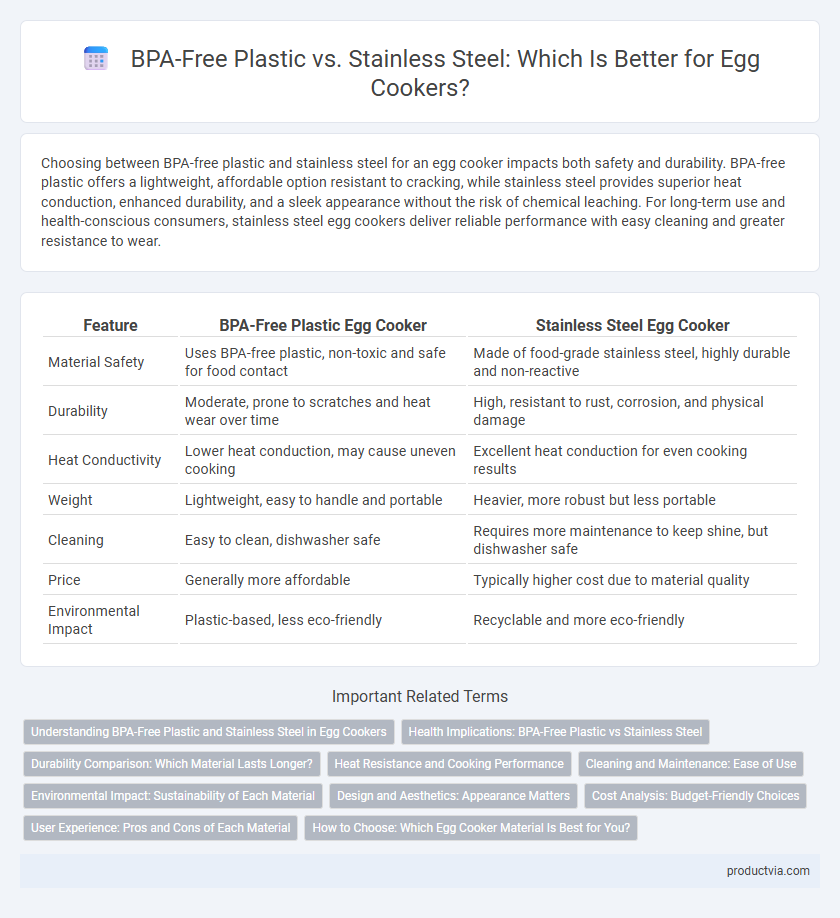Choosing between BPA-free plastic and stainless steel for an egg cooker impacts both safety and durability. BPA-free plastic offers a lightweight, affordable option resistant to cracking, while stainless steel provides superior heat conduction, enhanced durability, and a sleek appearance without the risk of chemical leaching. For long-term use and health-conscious consumers, stainless steel egg cookers deliver reliable performance with easy cleaning and greater resistance to wear.
Table of Comparison
| Feature | BPA-Free Plastic Egg Cooker | Stainless Steel Egg Cooker |
|---|---|---|
| Material Safety | Uses BPA-free plastic, non-toxic and safe for food contact | Made of food-grade stainless steel, highly durable and non-reactive |
| Durability | Moderate, prone to scratches and heat wear over time | High, resistant to rust, corrosion, and physical damage |
| Heat Conductivity | Lower heat conduction, may cause uneven cooking | Excellent heat conduction for even cooking results |
| Weight | Lightweight, easy to handle and portable | Heavier, more robust but less portable |
| Cleaning | Easy to clean, dishwasher safe | Requires more maintenance to keep shine, but dishwasher safe |
| Price | Generally more affordable | Typically higher cost due to material quality |
| Environmental Impact | Plastic-based, less eco-friendly | Recyclable and more eco-friendly |
Understanding BPA-Free Plastic and Stainless Steel in Egg Cookers
BPA-free plastic in egg cookers offers a lightweight, affordable, and non-toxic option that prevents harmful chemical leaching during cooking, making it safe for health-conscious users. Stainless steel, on the other hand, provides superior durability, corrosion resistance, and a sleek design, ensuring longevity and easy cleaning while maintaining food safety standards. Choosing between BPA-free plastic and stainless steel depends on priorities like budget, durability, and aesthetic preferences in egg cooker materials.
Health Implications: BPA-Free Plastic vs Stainless Steel
BPA-free plastic egg cookers reduce exposure to harmful bisphenol A, a chemical linked to hormonal disruptions, ensuring safer food preparation. Stainless steel egg cookers offer superior durability and do not leach any chemicals even under high heat, making them a safer long-term choice. Choosing stainless steel minimizes risks of plastic-related toxins, promoting better health outcomes during regular egg cooking.
Durability Comparison: Which Material Lasts Longer?
Stainless steel egg cookers outperform BPA-free plastic in durability due to their resistance to cracking, warping, and discoloration over time. BPA-free plastic models may degrade faster when exposed to high heat and frequent use, leading to potential brittleness and reduced lifespan. Choosing stainless steel ensures prolonged service life and consistent performance in egg cooking appliances.
Heat Resistance and Cooking Performance
Stainless steel egg cookers provide superior heat resistance, ensuring consistent and even cooking without the risk of warping or melting under high temperatures. BPA-free plastic models offer safety from harmful chemicals but may have lower heat tolerance, potentially affecting long-term durability and heat distribution. The choice between materials impacts cooking performance, with stainless steel delivering reliable thermal conductivity and plastic prioritizing non-toxicity and lightweight design.
Cleaning and Maintenance: Ease of Use
BPA-free plastic egg cookers offer lightweight design and smooth surfaces that simplify cleaning, preventing residue buildup and ensuring hygiene. Stainless steel models provide durability and resistance to stains and odors but often require more effort to maintain a polished appearance. Both materials support easy cleaning, with BPA-free plastic favoring convenience and stainless steel emphasizing long-term durability.
Environmental Impact: Sustainability of Each Material
BPA-free plastic egg cookers reduce the risk of harmful chemical leaching compared to traditional plastics but still pose environmental challenges due to their reliance on petrochemical resources and limited recyclability. Stainless steel egg cookers offer superior sustainability through durability, full recyclability, and resistance to corrosion, resulting in a longer lifespan and reduced waste. Choosing stainless steel supports eco-friendly manufacturing and end-of-life recyclability, promoting a lower overall environmental footprint.
Design and Aesthetics: Appearance Matters
BPA-free plastic egg cookers offer a lightweight, sleek design with translucent lids that allow users to monitor the cooking process, enhancing visual appeal and practicality. Stainless steel models provide a polished, modern look with a durable finish that resists stains and scratches, contributing to a premium kitchen aesthetic. Choosing between these materials depends on whether you prioritize the contemporary elegance of stainless steel or the vibrant, see-through functionality of BPA-free plastic.
Cost Analysis: Budget-Friendly Choices
BPA-free plastic egg cookers generally offer a more cost-effective option compared to stainless steel models, making them ideal for budget-conscious consumers. While stainless steel egg cookers provide superior durability and heat retention, their higher price point can be a drawback for economical buyers. Consumers seeking affordable yet safe egg cookers often prefer BPA-free plastic units due to their lower manufacturing costs and widespread availability.
User Experience: Pros and Cons of Each Material
BPA-free plastic egg cookers offer lightweight, affordable, and transparent designs that allow users to monitor cooking progress easily but may retain odors and are less durable over time compared to stainless steel. Stainless steel models provide superior heat conductivity, enhanced durability, and a sleek, rust-resistant finish that improves user confidence in long-term use but tend to be heavier and pricier while lacking transparency during cooking. Choosing between BPA-free plastic and stainless steel materials depends on user priorities balancing affordability, durability, and visibility during the egg cooking process.
How to Choose: Which Egg Cooker Material Is Best for You?
When choosing an egg cooker, BPA-free plastic offers lightweight design and affordability, ensuring no harmful chemicals leach into food, ideal for safety-conscious users. Stainless steel stands out for its durability, resistance to rust, and sleek aesthetic, perfect for long-term use and easy cleaning. Consider your priorities between health safety, longevity, and maintenance to select the material that best fits your kitchen needs.
BPA-free plastic vs Stainless steel for Egg Cooker Infographic

 productvia.com
productvia.com